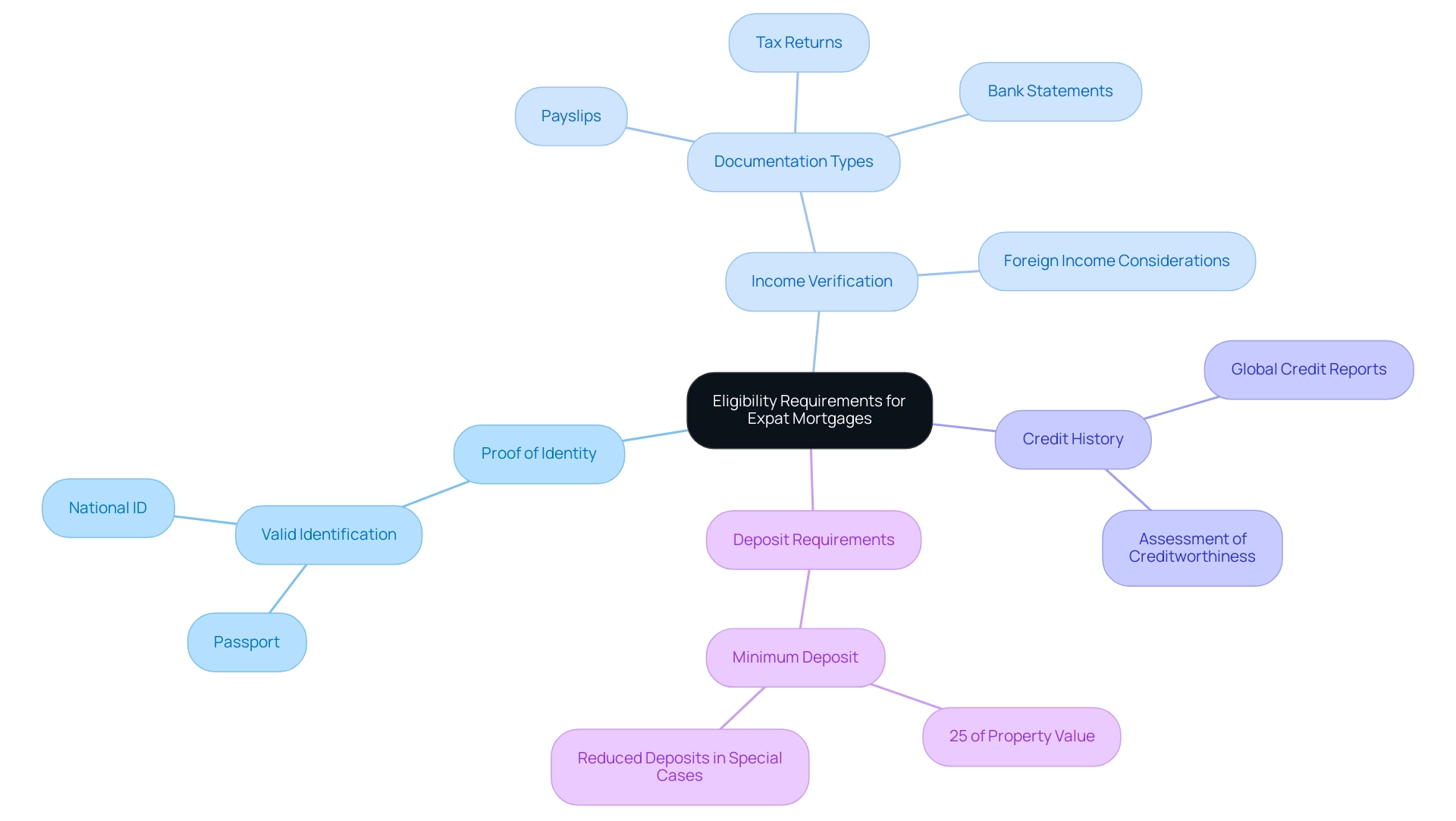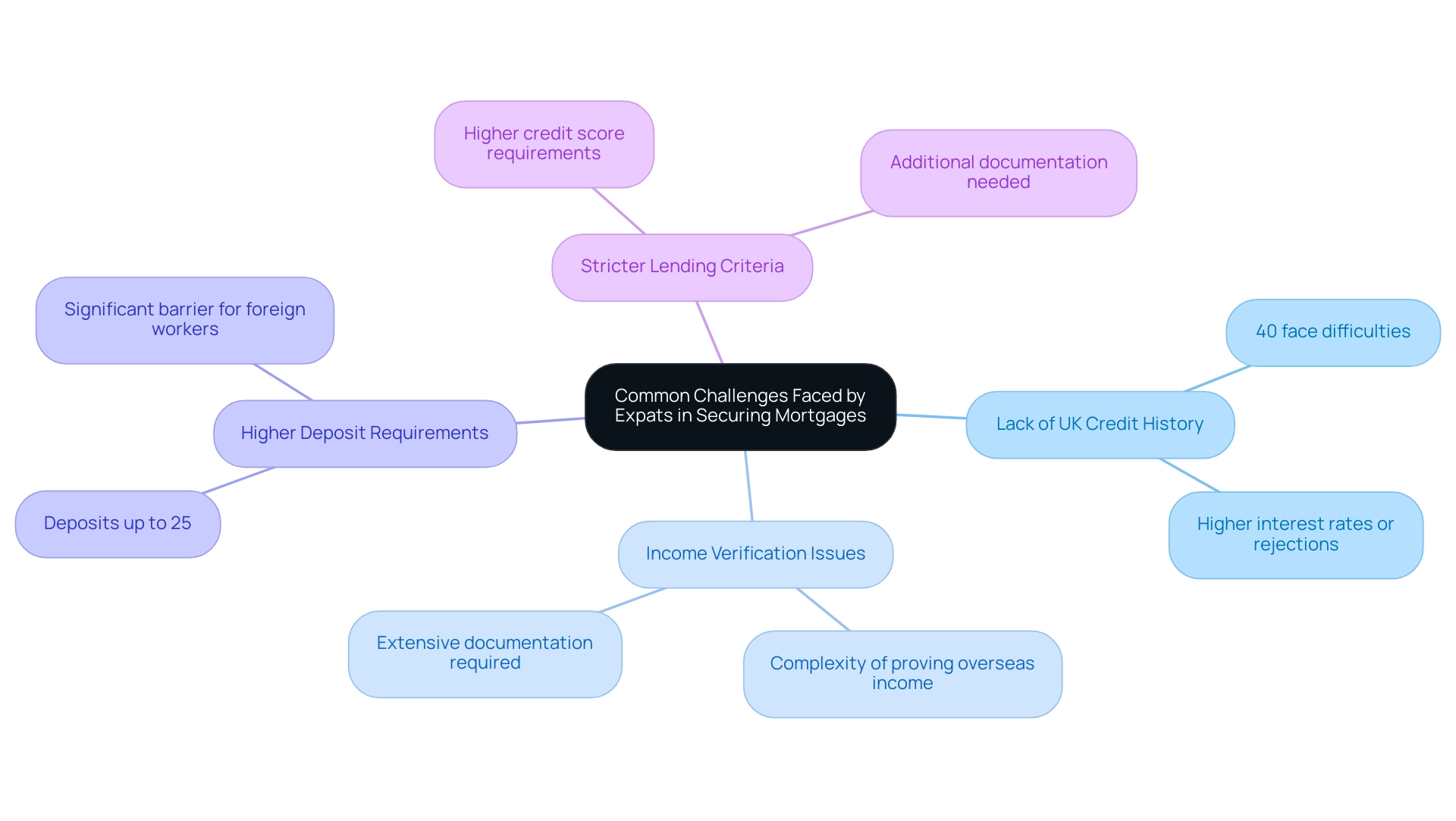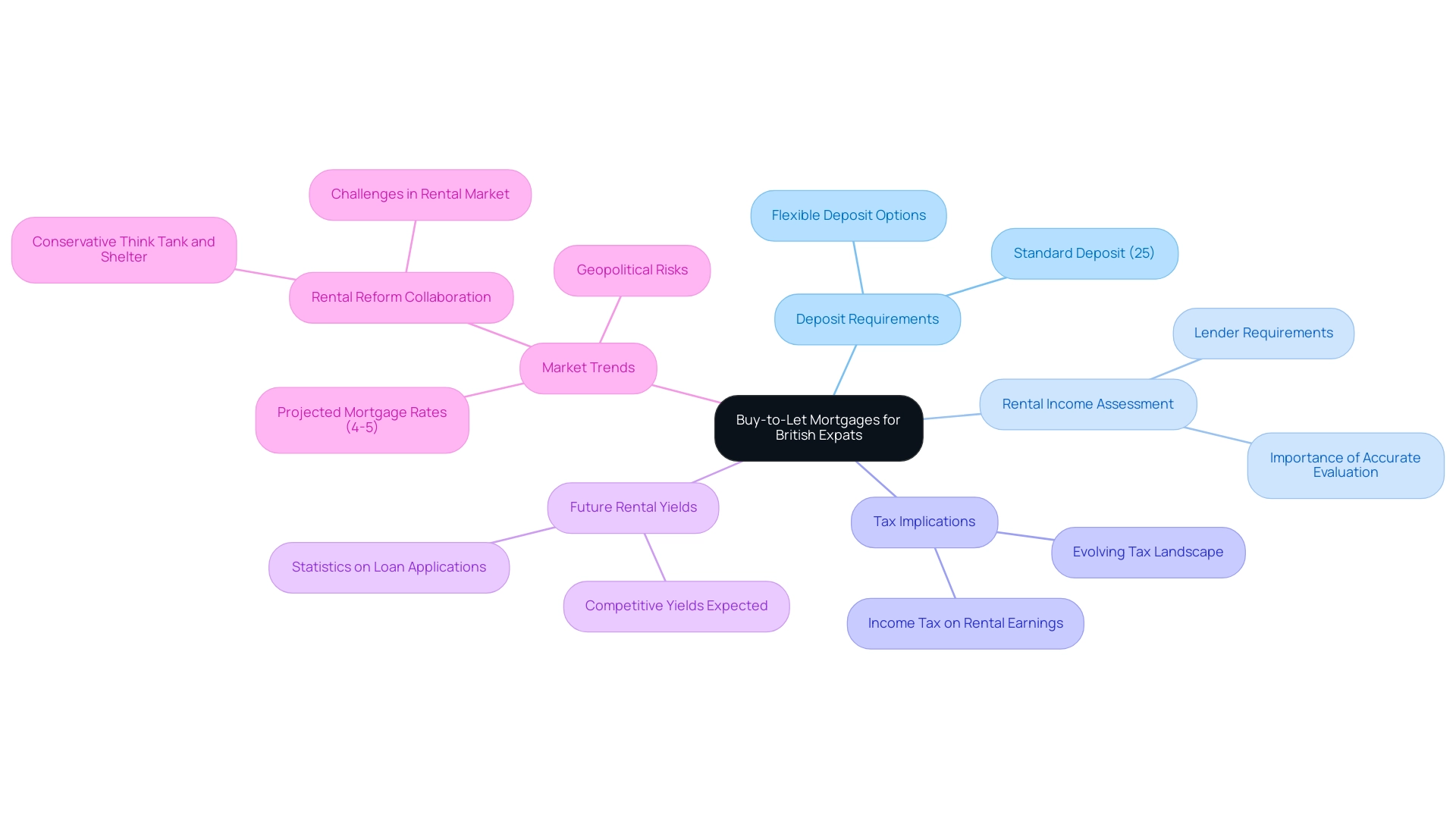Overview
UK mortgages for expatriates are becoming increasingly accessible, with specialized loan products tailored to meet the unique financial situations of UK citizens living abroad. Understanding eligibility requirements, challenges, and strategies for securing these mortgages is crucial.
- Tailored support from financial experts can significantly enhance expatriates' chances of successful loan applications.
- Are you aware of how these factors can impact your mortgage journey?
This article emphasizes the importance of leveraging expert guidance to navigate the complexities of expatriate mortgages effectively.
Introduction
Navigating the world of expat mortgages is a daunting task for UK citizens living abroad, particularly when securing financing for property investments back home. With the demand for these specialized loans on the rise—accounting for approximately 15% of all mortgage applications in the UK—understanding the unique challenges and opportunities that expats face is essential.
Tailored solutions that accommodate foreign income and the intricacies of documentation and eligibility requirements are crucial. This comprehensive overview illuminates how expatriates can effectively leverage their financial circumstances to achieve property ownership goals.
With expert insights and practical tips, this article aims to empower expats with the knowledge necessary to navigate this evolving landscape and make informed decisions about their mortgage options.
Understanding Expat Mortgages: A Comprehensive Overview
Expat loans represent specialized financial products designed specifically for UK citizens residing abroad who seek to invest in property within the UK. These loans cater to the unique financial circumstances of expatriates, often requiring different documentation and criteria compared to standard lending options. Understanding the complexities of overseas loans is essential, as they provide tailored solutions that reflect the financial realities of living internationally, particularly through the customized funding options offered by Finance Story.
In 2025, the expat loan market in the UK has witnessed remarkable growth, driven by an increasing demand from UK citizens relocating internationally. Current statistics reveal that approximately 15% of all loan applications in the UK now originate from expatriates, underscoring the significance of this segment within the broader market.
Expat financing typically encompasses a range of options, including residential loans for personal use and buy-to-let loans for investment purposes. Unlike traditional loan products, lenders may assess foreign income and evaluate creditworthiness based on international standards, which can differ markedly from UK norms. This flexibility empowers expatriates to secure financing that aligns with their distinct situations, and with Finance Story's personalized loan solutions, they can identify the most suitable funding options available.
Expert insights emphasize the importance of understanding the nuances of expatriate loans. Jonathan Samuels, Chief Executive of Octane Capital, notes that "the data originates from property consultancy Savills," highlighting the need for thorough research and discussions with lenders specializing in overseas financing to navigate the complexities involved. A notable case study from 2025 illustrates how a UK citizen living in Australia successfully secured a buy-to-let loan by leveraging their overseas income, demonstrating the potential for expatriates to effectively invest in the UK property market with the right support.
Overall, the landscape of expat loans in the UK is evolving, offering a variety of options to cater to the diverse needs of UK citizens abroad. By gaining a comprehensive understanding of these products and the application process, expatriates can make informed decisions that facilitate their property investment objectives. Additionally, the broader context of financial decision-making and risk management, as evidenced by the cancellation of the STRABAG SE transaction, underscores the importance of making informed choices in navigating the loan landscape.
This evolving market highlights the necessity for expatriates to remain informed about their options and the implications of their financial decisions, particularly with the guidance of Finance Story.
Eligibility Requirements for Expat Mortgages: What You Need to Know
Qualifying for a foreign mortgage necessitates meeting several essential criteria that may vary by provider but generally include the following:
- Proof of Identity: Applicants must provide valid identification, typically in the form of a passport, to verify their identity.
- Income Verification: Documentation demonstrating income is crucial. This may encompass payslips, tax returns, or bank statements, particularly if the income is derived from foreign sources. Financial institutions often require this information to evaluate the applicant's economic stability.
- Credit History: Although foreign residents may have limited UK credit history, financial providers will assess creditworthiness using global credit reports. This assessment assists financiers in evaluating the applicant's reliability in managing debt.
- Deposit Requirements: Most financial institutions stipulate a minimum deposit of 25% of the property's value. However, some may consider reduced deposits in particular situations, showing a readiness to adapt to various financial scenarios.
Understanding these criteria is vital for foreigners seeking to navigate the home loan application process effectively, particularly for UK mortgages for expats. For instance, a recent case study titled 'Innovative Lending Process' highlighted how Finance Narrative aided a foreign client in obtaining a home loan despite initial challenges regarding income verification. By leveraging its extensive network of boutique lenders, private investors, and conventional banks, Finance Tale was able to offer tailored options that suited the client's unique circumstances.
As of 2025, the typical deposit requirement for overseas property loans in the UK remains approximately 25%, consistent with broader trends in the lending market. Statistics reveal that the value of new loan commitments for dwellings in Australia reached $67.54 billion in June 2024, indicating a robust demand for housing finance. Furthermore, the increase in loan commitments classified as 'Other' by 3.9% from the September to December quarter of 2024 underscores the evolving landscape of mortgage financing, which encompasses expat mortgages.
By familiarizing themselves with these eligibility requirements and seeking expert guidance from Finance, expats can significantly enhance their chances of securing favorable UK mortgages and achieving their property ownership aspirations. Engaging with Finance narratives for home loan solutions is both straightforward and efficient, ensuring clients receive personalized support and access to the best market products. Finance's professionalism and profound understanding of the finance sector further reinforce its capability to assist clients in navigating these complexities, ensuring streamlined home loan solutions tailored to their needs.
Contact Finance Story today to explore how we can help you secure your dream home.

Common Challenges Faced by Expats in Securing Mortgages
Expats frequently encounter a variety of challenges when applying for UK mortgages, complicating their path to homeownership. Understanding these obstacles is crucial for navigating this landscape effectively.
- Lack of UK Credit History: A significant hurdle for many expats is the absence of a UK credit history. This limitation complicates lenders' ability to assess creditworthiness, often leading to higher interest rates or outright rejections. In 2025, statistics indicate that nearly 40% of foreign workers face difficulties due to insufficient credit history, highlighting the importance of establishing some form of credit in the UK prior to applying.
- Income Verification Issues: Proving income from overseas can be particularly complex. Many expats receive income in foreign currencies or from multiple international sources, complicating the verification process. This situation can result in delays or complications in loan applications, as lenders may require extensive documentation to confirm income stability.
- Higher Deposit Requirements: Expat mortgages often necessitate larger deposits compared to standard mortgages. This requirement can pose a significant barrier, as many foreign workers may not have immediate access to substantial funds for a down payment. Some financial institutions may request deposits of up to 25% when applying for UK mortgages, which can be daunting for those relocating.
- Stricter Lending Criteria: Due to perceived risks associated with lending to foreign nationals, many lenders impose stricter criteria. This can include higher credit score requirements and additional documentation, potentially leading to rejections for applicants who do not meet these heightened standards.
Grasping these challenges is essential for expats as they prepare their loan applications. For instance, Sarah, a primary school teacher living in Singapore, faced significant hurdles when trying to secure a mortgage to return to Australia. With specialized support from Finance, which boasts over 25 years of experience in business improvement and technology implementation, she successfully navigated the complexities of income verification and fluctuating exchange rates, ultimately achieving her dream of settling in Melbourne.
Finance's tailored approach ensured that Sarah received the guidance necessary to overcome these obstacles, making the process as easy as 1, 2, 3.
Furthermore, Finance Story offers a variety of services specifically tailored for expatriates, including assistance with income verification, access to the latest loan products, and customized support throughout the application process for UK mortgages. The flexibility provided by numerous lenders today, such as electronic signing options and remote communication, enables overseas residents to manage their home loan settlements without needing to return to Australia. This innovation is crucial in assisting individuals living abroad to navigate geographical obstacles and simplify the loan process.
As Ash Khan, Founder & Principal Broker of DotCapital, emphasizes, "His passion lies in helping individuals and businesses build wealth through smart strategic lending." This sentiment aligns with Finance's commitment to flexibility in the lending process, reinforcing their position as a reliable ally for foreign residents.
By proactively addressing these challenges, Finance Narrative enhances the likelihood of overseas professionals obtaining advantageous loan conditions and successfully navigating the UK real estate market. If you're a foreign resident seeking tailored loan assistance, reach out to Finance Story today to discover how we can support you in achieving your homeownership objectives.

Improving Your Chances: Tips for Securing an Expat Mortgage
To enhance your chances of securing an expat mortgage in 2025, consider the following strategies:
- Build a Strong Credit Profile: Start by ensuring your credit report is accurate and up-to-date. Regularly check for errors and rectify them promptly. Paying off existing debts and avoiding late payments can significantly boost your credit score, making you a more attractive candidate for financial institutions. Experts emphasize that a solid credit profile is crucial for foreign residents looking to secure UK mortgages for expats, as it reflects financial responsibility and reliability.
- Gather Comprehensive Documentation: Prepare all necessary documentation ahead of time. This includes proof of income, tax returns, bank statements, and identification. Having these documents arranged can simplify the application process and demonstrate your readiness to financial institutions, which is especially crucial for foreign residents seeking UK mortgages for expats who may encounter extra scrutiny.
- Consult with a Specialist Broker: Engaging with a finance expert like Finance, who specializes in UK mortgages for expats, can provide you with tailored insights and access to lenders familiar with the unique challenges faced by expatriates. Finance Story offers personalized support and expertise, ensuring you find the best options available in the market. Their extensive knowledge of the mortgage landscape can help navigate complexities, making the process smoother for you.
- Consider a Larger Deposit: If feasible, aim to save for a larger deposit. A larger deposit decreases the loan-to-value (LTV) ratio, which can significantly improve your appeal to financial institutions. Statistics indicate that applicants with larger deposits often experience higher approval rates, as they present a lower risk to lenders. Recent data shows that balances in offset accounts have risen from 9.7% to 10.4% of total credit limits, and more recently to 11%, indicating a trend towards larger deposits among borrowers. This trend can be advantageous for expats seeking UK mortgages for expats to enhance their chances of loan approval.
Implementing these strategies can greatly enhance your loan application for UK mortgages for expats, increasing your chances of approval and assisting you in securing the necessary financing for your property in the UK. Furthermore, despite an increase in non-performing loans caused by elevated interest rates, the overall asset quality in residential loans remains stable, offering assurance about the reliability of the lending market. This context is crucial for expats who may be concerned about the security of their investments.
As one satisfied client, Natasha B. from VIC, stated, "I will definitely be recommending your business to anyone. We are finished with the constant worry. Once again, thank you so much for being a part of our journey."
With Finance's custom loan services, you can tackle these challenges with assurance.
Contact Finance Story today to discover how we can help you in finding the best value loan products tailored to your needs.
Which UK Banks Offer Expat Mortgages? A Guide to Your Options
A range of UK banks and financial organizations cater to the distinct needs of expatriates seeking UK mortgages as financing options. Among the leading providers are:
- HSBC Expat: Renowned for its extensive overseas home loan offerings, HSBC provides tailored solutions, including buy-to-let options that allow expatriates to invest in UK property while living abroad.
- Suffolk Building Society: This institution specializes in a range of home financing products, particularly UK mortgages for expats, designed specifically for UK nationals residing overseas, ensuring that their offerings align with the financial circumstances of expatriates.
- Skipton International: Known for competitive rates and flexible terms, Skipton International is an attractive option for expatriates seeking UK mortgages, making it easier to navigate the complexities of cross-border financing.
- NatWest International: Offering a diverse array of home loan options for non-residents and expatriates, NatWest International is committed to providing accessible financing solutions, including UK mortgages for expats, tailored to the needs of those living outside the UK.
Researching these banks and their specific offerings is crucial for expatriates to identify the most suitable UK mortgages as home financing solutions. In 2025, the landscape for expat home loans is expected to evolve, with UK Finance forecasting continued demand for housing despite economic fluctuations. Notably, the Bank of England will update the sterling exchange rate index weights on 12 March 2025, which could influence loan rates and lending conditions.
Furthermore, the next edition of home loan lending statistics will be published on 10 June 2025, emphasizing the importance of staying informed about market conditions.
Case studies reveal that many young adults face significant challenges in home ownership, with a notable percentage lacking sufficient savings for a deposit. This trend highlights the significance of comprehending the housing finance environment, especially for expatriates who might be facing challenges related to UK mortgages from overseas. Financial analysts indicate that although the market remains stable, the top financing choices for expatriates will rely on personal situations and the wider economic landscape.
As such, it is essential for foreign residents to stay informed about the latest offerings and market conditions to secure the best possible financing options, such as UK mortgages for expats, for their property investments.
Exploring Buy-to-Let Mortgages for British Expats
Buy-to-let loans present a compelling investment opportunity for British expatriates seeking UK mortgages to acquire rental properties. Several critical factors warrant careful consideration:
- Deposit Requirements: Typically, a deposit of 25% is standard for buy-to-let mortgages. However, certain financial institutions may offer flexibility, accepting lower deposits under specific circumstances, which can be advantageous for expats aiming to maximize their investment potential.
- Rental Income Assessment: Lenders usually assess the anticipated rental income to ensure it adequately covers loan repayments. A minimum rental yield is often required, varying by lender. Financial advisors stress the importance of accurately evaluating rental income, as it plays a pivotal role in the approval process for UK mortgages for expats and overseas buy-to-let mortgages.
- Tax Implications: Understanding the tax responsibilities associated with owning rental properties in the UK is essential for expatriates. This includes income tax on rental earnings, which can significantly affect overall profitability. Staying informed about the evolving tax landscape is vital for effective financial planning.
Looking ahead to 2025, average rental yields for buy-to-let properties in the UK are expected to remain competitive, making this an attractive option for foreign residents. Statistics indicate that successful buy-to-let loan applications by British expatriates have increased, reflecting a growing interest in this investment strategy. Case studies reveal that many foreign residents have adeptly navigated the loan process, leveraging their unique circumstances to secure favorable conditions.
As the market evolves, expert opinions suggest that British expatriates should remain vigilant regarding geopolitical risks and economic factors that may influence loan rates, projected to range between 4% and 5% in 2025. Additionally, a recent partnership between a conservative-led think tank and Shelter aims to propose a new vision for rental reform, addressing challenges in the rental market that could impact foreign residents. Kate Davis, Executive Director, remarked that "buy-to-let landlords continue to face the challenge of increased regulation and higher taxes and will be looking to run their property businesses as efficiently as possible."
By comprehending these dynamics and preparing accordingly, expats can effectively seize the opportunities presented by UK mortgages for expatriates, all while building a profitable investment portfolio and maintaining strong ties to their home country.

Conclusion
The landscape of expat mortgages presents both challenges and opportunities for UK citizens living abroad who seek to invest in property back home. Understanding the unique eligibility requirements—such as proof of identity, income verification, and credit history—is crucial for successfully navigating the mortgage application process. With an increasing demand for these specialized loans, accounting for approximately 15% of all mortgage applications in the UK, expats must remain informed about their options and the evolving market dynamics.
Key challenges, including the lack of UK credit history and stricter lending criteria, can complicate the journey to homeownership for expatriates. However, by employing strategic approaches—such as:
- Building a strong credit profile
- Gathering comprehensive documentation
- Consulting with specialized mortgage brokers like Finance Story
expats can significantly enhance their chances of securing favorable mortgage terms. The insights shared by industry experts further emphasize the importance of thorough research and tailored solutions to address individual financial situations.
As the expat mortgage market continues to evolve, it becomes increasingly vital for expatriates to stay updated on the latest offerings from banks and financial institutions. Exploring options like buy-to-let mortgages can provide a profitable avenue for investment, particularly in a competitive rental market. By understanding the complexities involved and leveraging professional guidance, expats can successfully navigate the mortgage landscape and achieve their property ownership goals, reinforcing their connection to the UK while building a secure financial future.




